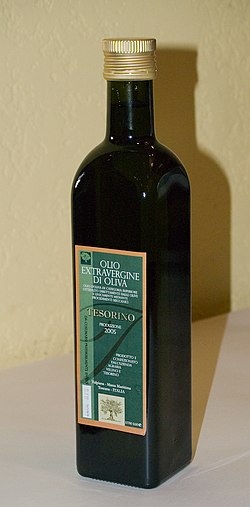- For other uses, see Oil (disambiguation).
Oils are an arbitrary group of certain common substances that are in a viscous liquid state ("oily") at ambient or slightly elevated temperatures and that are hydrophobic (literally "water fearing", meaning immiscible with water) and lipophilic (literally: "fat loving", meaning micscible with other oils). This general definition includes compound classes with otherwise unrelated chemical structures and properties as well as uses, including vegetable oils, animal fats, petrochemical oils, and volatile essential oils.


Examples
Biological
- Vegetable oil, non-volatile oils extracted from plants, usually the seeds
- Essential oil, volatile aromatic oils extracted from plants
- Animal fat, obtained from animal sources
Synthetic
- Synthetic oil, manufactured from smaller molecules using chemical processes
Mineral
Applications
- Food oils
Several edible vegetable and animal oils, and also fats, are used for various purposes in cooking and food preparation. In particular, many foods are fried in boiling oil, which is much hotter than boiling water. Oils are also used for flavouring and for modifying the texture of foods.
Health advantages are claimed for a number of specific oils such as omega 3 fish oils, evening primrose oil, flaxseed oil, etc.
Trans fats, often produced by hydrogenating vegetable oils, are known to be harmful to health.
- Oil as fuel
Oils contain a large amount of stored energy, which can be converted by burning into other forms of energy. Oils are used for heating, lighting (e.g. kerosene lamp) and powering combustion engines. Oils used for this purpose are usually derived from petroleum (fuel oil, diesel oil, gasoil, etc. Renewable biological sources of energy, some of which are oils, are being evaluated as an alternative to petroleum products due to concerns about global warming and cost.
Due to their non-polarity, oils do not easily adhere to other substances. This makes them useful as lubricants for various engineering purposes. Suitable oils are often found in the mineral spectrum, as biological oils degrade quickly in most environmental conditions.
Petrochemistry is the process of refining crude oil into useful raw materials, plastics, and other oils.
Many oils have higher boiling points than water and lower electrical conductivity, allowing them to be used for liquid cooling systems, especially where electricity is used.
Color pigments can be easily suspended in oil, making it suitable as supporting medium for paints. The slow drying process and miscibility of oil facilitates a realistic style. This method has been used since the 15th century.
Oils have been used throughout history as a fragrant or religious medium. Oil is often seen as a spiritually purifying agent.
See also
- Emulsifier, allow oils and water to mix
- Wax, compounds with oil-like properties that are solid at common temperature